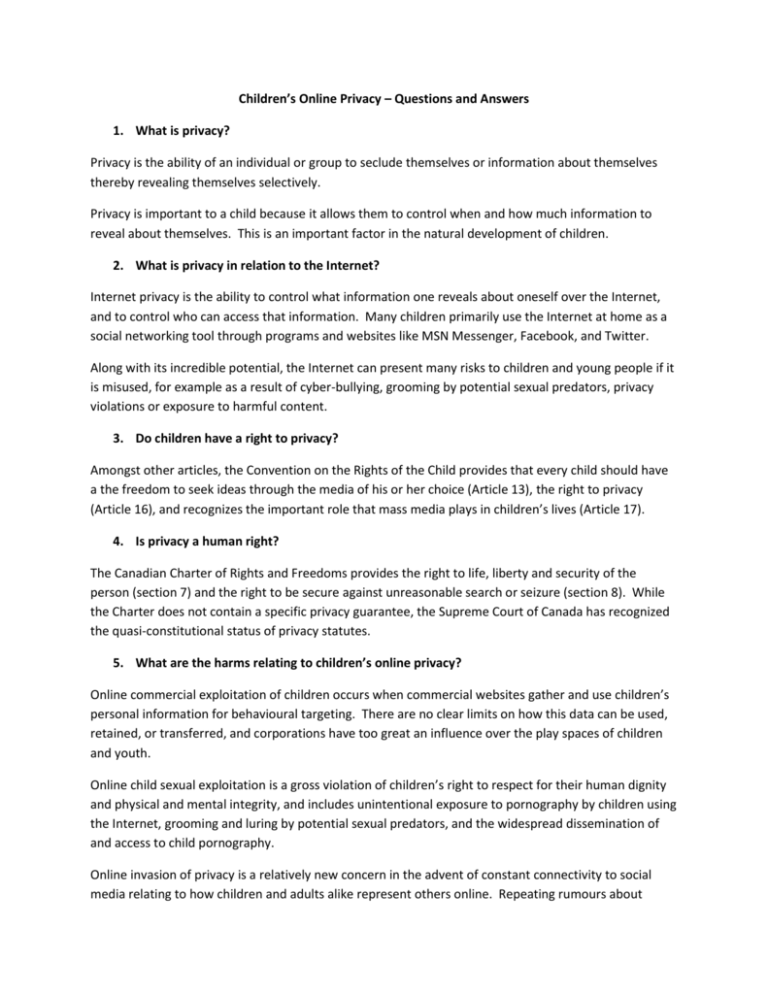
Children’s Online Privacy – Questions and Answers
1. What is privacy?
Privacy is the ability of an individual or group to seclude themselves or information about themselves
thereby revealing themselves selectively.
Privacy is important to a child because it allows them to control when and how much information to
reveal about themselves. This is an important factor in the natural development of children.
2. What is privacy in relation to the Internet?
Internet privacy is the ability to control what information one reveals about oneself over the Internet,
and to control who can access that information. Many children primarily use the Internet at home as a
social networking tool through programs and websites like MSN Messenger, Facebook, and Twitter.
Along with its incredible potential, the Internet can present many risks to children and young people if it
is misused, for example as a result of cyber-bullying, grooming by potential sexual predators, privacy
violations or exposure to harmful content.
3. Do children have a right to privacy?
Amongst other articles, the Convention on the Rights of the Child provides that every child should have
a the freedom to seek ideas through the media of his or her choice (Article 13), the right to privacy
(Article 16), and recognizes the important role that mass media plays in children’s lives (Article 17).
4. Is privacy a human right?
The Canadian Charter of Rights and Freedoms provides the right to life, liberty and security of the
person (section 7) and the right to be secure against unreasonable search or seizure (section 8). While
the Charter does not contain a specific privacy guarantee, the Supreme Court of Canada has recognized
the quasi-constitutional status of privacy statutes.
5. What are the harms relating to children’s online privacy?
Online commercial exploitation of children occurs when commercial websites gather and use children’s
personal information for behavioural targeting. There are no clear limits on how this data can be used,
retained, or transferred, and corporations have too great an influence over the play spaces of children
and youth.
Online child sexual exploitation is a gross violation of children’s right to respect for their human dignity
and physical and mental integrity, and includes unintentional exposure to pornography by children using
the Internet, grooming and luring by potential sexual predators, and the widespread dissemination of
and access to child pornography.
Online invasion of privacy is a relatively new concern in the advent of constant connectivity to social
media relating to how children and adults alike represent others online. Repeating rumours about
others or posting photographs of others online without permission can be construed as an invasion of
privacy, raising the risk of civil liability for libel, defamation, and other torts against a person’s
reputation.
6. What has been done?
Canadian and international privacy and data protection commissioners passed resolutions in 2008:
-
-
Canadian privacy commissioners established the Regina Resolution in June 2008, calling for an
education-based approach that encourages cooperation among commissioners, governments,
industry and organizations to improve online privacy for children.
The International Conference of Data Protection and Privacy Commissioners created the
Strasbourg Resolution in October 2008, calling on countries to work together and to devote
resources to the matter of children’s online privacy in their respective jurisdictions.
The United States passed the Children’s Online Privacy Protection Act in 1998, which requires operators
of commercial websites to require “verifiable” parental consent to collect information from children
under the age of 13. It has largely been ineffective in protecting the online privacy of children as there is
no way to verify parental consent, website privacy policies are often difficult to understand and are
often not read by users, and only requires consent for information that can specifically identify a child.
Quebec’s Consumer Protection Act bans any advertising at children under the age of 13 on the basis that
children under this age are particularly susceptible to the manipulative content of advertising
campaigns.
7. What else can be done?
The Children’s Online Working Group’s discussion paper posits a number of law reform proposals to
better protect children’s privacy online, including:
a. Limit/prohibit online collection children’s personal identifying and non-identifying
information through commercial websites;
b. Limit/prohibit advertising directed at children under the age of 13;
c. Prohibit embedded advertising in children’s online game and play spaces;
d. Require Internet service providers to retain customer data to assist with law enforcement
activities;
e. Require Internet service providers to disclose customer personal information for the
purpose of law enforcement activities;
f. Require Internet service providers to block access to websites containing images of child
pornography;
g. Mandatory reporting of child pornography for all persons;
h. Prevent child sexual abuse materials from being disclosed to defence counsel during
criminal proceedings;
i. Enshrine children’s right to privacy.







